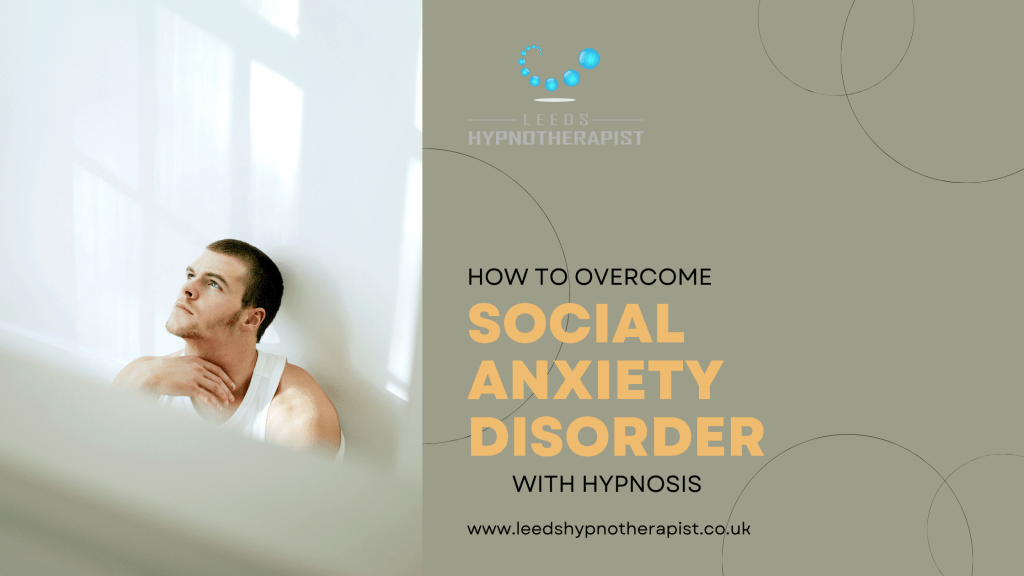Social anxiety disorder appears to have become even more prevalent with lockdowns and social distancing rules around the world. We have so much conflict around these with people at opposite ends of the spectrum. At one end of the spectrum, there are people going beyond the limitations in place and not wanting to be around people full stop. On the other, there are people who refuse to accept any restrictions on what they do. Then we have the majority who are somewhere in the middle.
For those with generalized anxiety disorder, it can be a very scary time. Not knowing which way to turn as their minds second guess them. Many people that didn’t have social anxiety disorder before have found it creeping in due to not spending a lot of time with other people. So now we have more people with social anxiety disorder looking for help with how to treat it.
Most people think that people with anxiety are merely nervous, but this is not true. Anxiety does not have to be debilitating; it can leave you feeling happy and energised, but it can also lead to feelings of depression and hopelessness which will negatively affect your performance at work or in everyday life.
Back in 2012, there were around 5.9 million people aged from 18 to 64 years old experiencing symptoms of social anxiety disorder (SAD). This translates into one person every four seconds in the UK alone. As you can appreciate with everything going on in the world right now, that number will be much higher.
Hypnotherapy has become increasingly popular as a treatment option in the last few years due to its effectiveness when using hypnosis to stop avoidance behaviours associated with SAD. Hypnosis has been used in research studies as an effective treatment for many different types of problems including addiction and eating disorders.
Hypnosis works by focusing on what we want and raising our attention towards these goals instead of distracting ourselves with thoughts about our problems or thinking negative thoughts about ourselves or others. Hypnosis also helps us generate positive thoughts instead of negative ones so that we are more likely to approach situations with an attitude that is positive rather than one that is negative or fearful.
Another benefit associated with hypnosis is that while we are being hypnotised we are unaware of our own thoughts, so we cannot help but imagine all the things that would happen if we achieved what we want while being hypnotised! This creates an especially powerful goal-setting mechanism that allows us to focus on only the things that we want! In other words: if you don’t want a job interview right now please think about it later!
Almost everyone will describe themselves as having social anxiety disorder at some point in their lives; however, it may take time for you to identify whether you have SAD or not – especially if you have never experienced any symptoms such as self-consciousness or speaking in public or even bad feelings like embarrassment, shame or guilt. You may be wondering if it is possible to get rid of social anxiety disorder, you may be wondering if hypnotherapy can help you escape the endless list of unwelcome things that happen when you are in public – so we will endeavour to answer that question.
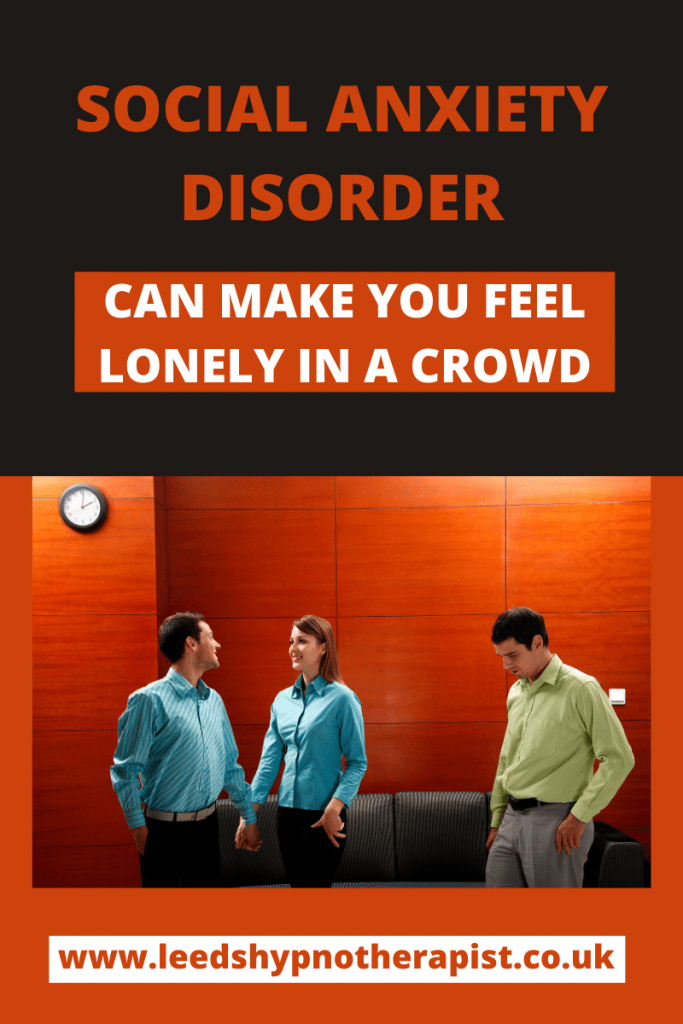
What is Social Anxiety Disorder?
Social anxiety disorder is very similar to other anxiety disorders in that you have certain feelings, physical symptoms and reactions to events that you label as anxiety. Some may call it a kind of social phobia as it encourages you to avoid certain groups or places.
For some, there may be a social phobia around being around large groups of people either indoors, outdoors or both. You may experience social anxiety disorder around large groups due to the noise levels or it could be the physical symptoms as if you are being closed in.
Some people experience social anxiety disorder symptoms around going to work. There could be hidden beliefs around not being good enough, a feeling of dissatisfaction with the work being done or the job itself. A social anxiety disorder may shift into an anxiety disorder around travelling to work as your subconscious mind is trying to stop you from going to work.
A social anxiety disorder may stop you from speaking to your family or friends. When people call or message you, you may find yourself ignoring your phone so that you don’t have to face speaking to someone. You may that you regularly cancel plans with people due to social anxiety disorder.
It can be triggered by many different things: a specific person (such as your boss), an idea (like talking to someone from another country), or even just thinking about it. Social anxiety disorder occurs when the fear and worry associated with a social situation are so intense that it interferes with your ability to function normally.
The term has been used since the 1970s, but its precise meaning and diagnosis were not understood for several decades. Research into social anxiety disorder began in the early 1990s and continues today.
The most effective way to treat social anxiety disorder is through hypnotherapy – using specially designed hypnotherapy sessions to release certain parts of your brain that cause an overwhelming fear of being judged negatively in social situations.
Anxiety Disorders Explained
There are two types of anxiety disorders: social anxiety disorder and generalised anxiety disorder.
Social anxiety disorder is a chronic, moderate-to-severe form of anxiety (e.g. the fear of public speaking, or the fear of being rejected by someone) that causes significantly increased self-consciousness and reduced social actions in the context of social situations (e.g. shyness).
Generalised anxiety disorder is a more acute form of this disorder and is defined as a condition characterized by ongoing fearful thoughts, worries, or apprehension in social settings (e.g. walking into a room where many people are present) in which the individual has a negative expectation or anticipatory feeling about those situations (e.g. showing up to work 10 minutes late). Fear of flying is another type of anxiety issue.
People who have social anxiety disorder tend to also have (or had) issues with other anxiety disorders as well. Basically, anxiety disorders are a reaction from your nervous system telling you that there is a potential danger or threat present or on its way. If you have an anxiety disorder about feelings of inadequacy, you could develop social anxiety disorder around speaking to other people you perceive as being “higher” than you.
Imagine that you have a car with a car alarm. Your car alarm is there to alert you of any threat to your car. If someone tries to break into your car the alarm will sound to let you know. Once the threat is gone, the alarm is either reset by you or it resets itself.
Anxiety disorder is when your alarm system is alerting you when there isn’t a genuine threat or danger. It is perceiving normal everyday situations as a danger and your alarm is sounding to these.
You might see a group of people who are safe yet with social anxiety disorder, you will feel threatened and possibly have an intense fear. This type of social phobia will try to keep you away from groups of people whether they are safe or not.
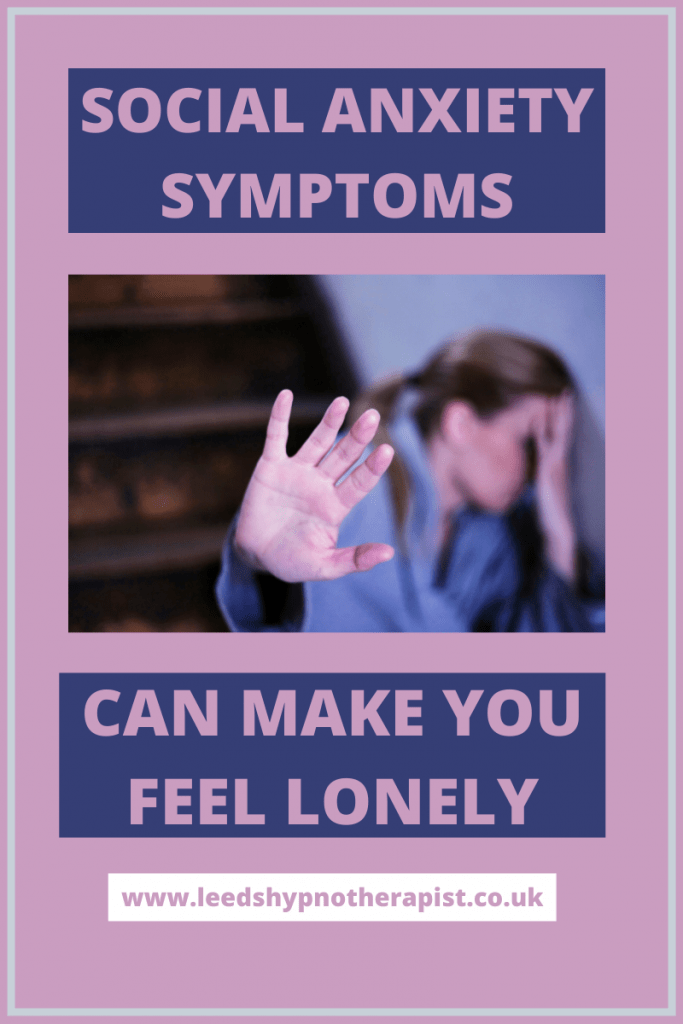
What Are Social Anxiety Symptoms?
Social anxiety is a common problem that affects people in different ways. It can affect men and women equally, but it is more commonly seen in men.
While some people are able to control their anxiety, others have to seek treatment for this anxiety. In the majority of people with social anxiety, there is a lack of self-esteem. This causes their social interactions to be difficult and leave them feeling alone and isolated.
When you go to see your therapist, the first thing they’ll do is ask about your ability to cope with social situations, which can help you identify if your social anxiety is caused by an underlying psychological disorder or just a difficulty in adapting to life in general.
This chat may include asking you questions about how you feel about dating; what situations cause you stress; how well do you do in talking with new people; and how confident are you about public speaking.
Symptoms of social anxiety disorder can vary from person to person yet tend to fit the same pattern of all anxiety disorders. Social anxiety disorder is more than just simple shyness. You could be experiencing the following symptoms of social anxiety disorder:
- Low confidence or self-esteem
- Personal relationships suffering
- Work or school life suffering
- Avoiding people
- Feeling judged by others and yourself
- Fear of being harmed
- Depression
- Substance misuse
- Suicidal Ideation
- Nervousness or sick spinning feeling in your tummy
These are just some of the signs and symptoms you may be experiencing due to social anxiety disorder.
What Is It Like to Have Social Anxiety Disorder?
Social anxiety disorder (SAD) is a condition in which people feel trapped, nervous and unable to talk to people. The disease affects up to 7.2 million Americans and a similar number of sufferers in the UK. It is caused by an abnormal response to social situations that causes the person to be overly sensitive and panic-stricken. As a result, they feel “on guard” in social situations, which can lead them to avoid or limit their social life.
The condition is often associated with low self-esteem, as well as a fear of rejection or embarrassment. People who suffer from SAD are generally told that “social anxiety is normal” by those around them. In fact, those who suffer from this condition often say that they are “normal” compared to their peers – perhaps because they feel isolated from their peers and society at large? This may be why many people with SAD are not very confident when it comes to meeting new people or initiating conversations with strangers – they feel awkward or ill at ease with this environment.
In addition, many people with SAD have been known to have difficulty getting along with others and having relationships casually. They may find it difficult sometimes to be part of groups where other people are not very different from themselves – maybe the group is too large? Or maybe it’s too small? Or maybe there just isn’t much diversity in the group?!
Despite what some may think, there are many reasons why people don’t get along well with others or have relationship problems in general – it could be your age, gender identity, race/ethnicity or sexual orientation… There really isn’t an easy way for you to work out how you don’t get along well with others and what you should do about it – but hypnotherapy helps you do exactly this!
It’s great for anyone who feels shy when talking to new people – whether you’re shy around children or adults – but also if you suffer from social anxiety disorder (SAD), which affects roughly 5% of all adults worldwide: https://www.ncbi.nlm.nih.gov/pmc/articles/PMC3738347/
Social anxiety disorder (SAD) is a condition characterised by extreme fear of social situations—particularly fear of being judged negatively by others—and excessive worry that one will be embarrassed or punished by others if one shows any sign of discomfort during these situations, leading to marked anxiety and avoidance of all social situations. It may develop gradually or suddenly, affecting everyone, but puts most people in a state of considerable distress.
Social anxiety disorder is sometimes caused by anxiety disorders such as panic disorder, social phobia and specific phobia. It can also be the result of medication and other psychoactive drugs which have a sedative effect on the central nervous system or that which is the direct result of trauma or dissociative experiences. It normally tends to become less severe as people get older. Social anxiety is a common phobia that has a strong stigmatising effect. It is highly persistent and can follow typical patterns of development, such as: –
- Children and teens that feel uncomfortable strolling around a town or city centre, or talking to strangers. It often starts with shyness, or lack of confidence in speaking to others, and then progresses to an intense fear of social situations which has a strong distancing effect.
- Girls develop these fears early in adolescence and these can last for life; some girls may be very anxious about entering adult social situations.
- Some girls develop these fears in combination with a general social phobia or OCD.
- Some men may develop in menopausal years, especially if they go through puberty. The fear of social situations and anxiety can be very emotionally painful.
- Women are often raised in a family environment where they feel uncomfortable being embarrassed in front of others and being surrounded by strangers.
The fear can be passed down to children since this is the main way these fears traditionally started. The fear also occurred when people were isolated, alone or in groups of five or more.
What Does It Feel Like? The Physical Symptoms of Social Anxiety Disorder
Social anxiety disorder is an anxiety disorder that involves excessive fear of social situations and interactions. This can lead to feelings of shyness, embarrassment and general discomfort.
Social anxiety is often accompanied by problems with concentration, memory, motor coordination and other mental functions. In addition, it may cause problems with cognitive function, such as short-term memory loss and difficulty in concentrating on tasks. Social anxiety can also be linked to a variety of physical symptoms including sweaty palms, trembling hands and heart palpitations.
The condition is characterised by a feeling of being “on guard” or anxious about social situations, often occurring during the course of a day or during the act of talking to people. Although this may sound like it’s related to being afraid of something like an impending storm or exam in the classroom, the majority of social anxiety isn’t based on fear; it’s based on avoidance.
Social anxiety disorder generally has no clear physical cause; however, there are some studies that have revealed that social anxiety is associated with an increased risk for developing certain other medical conditions such as cardiovascular disease and diabetes. Other people have suggested that it could be a form of hypochondria (fear of illness) that causes them to avoid activities they believe they should be able to perform well because they’re worried they’ll get sick if they do so.
You and everyone else that has issues with social anxiety disorder will have their own way of experiencing it as well as your own triggers. Most common are rapid and/or shallow breathing, intense fear about going into certain situations, sweating and shaking.
What Causes It?
Social anxiety disorder (SAD) is caused by past traumatic events, normally experienced when very young. Often during hypnotherapy sessions, the root cause for clients isn’t the trigger that gives them social anxiety currently. For instance, someone I was working with recently had social anxiety disorder. When we looked back to where it came from it was from the death of her grandad aged 5 and seeing all of the adults around her being upset. She felt helpless as she was unable to help her parents and other family members with being so young.
Her subconscious mind associated the grief that people were experiencing and her feeling of being helpless with social situations. Once the emotions around this event were cleared, she was then able to go into shops again and go out with her friends without feeling depressed or scared.
The triggers for social anxiety disorder that you are experiencing probably aren’t the real reason why you have it. Even if it is from something big, it tends to be something else entirely.
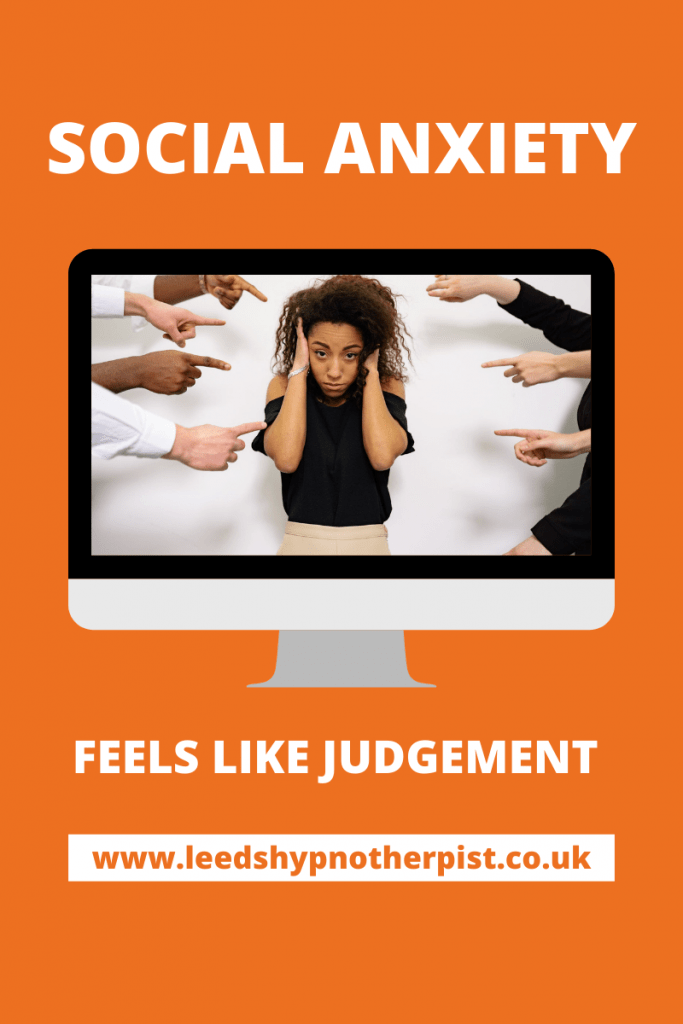
How Can It Affect Your Life?
Social anxiety disorder is a common condition that affects up to 1 in 5 people at some point in their lives. It’s characterized by feelings of extreme discomfort, apprehension and nervousness when meeting new people or being exposed to new situations. It can lead to a sense of helplessness and hopelessness.
People with social anxiety disorder often have poor self-esteem, are angry and resentful, suffer from depression and are rarely satisfied with their lives. Social anxiety disorder can cause significant distress but is also treatable if it’s understood as a consequence of your personality type or the way you were brought up.
Things You Can Try to Overcome Social Anxiety Disorder
Anxiety disorders are typically treated with medications, such as selective serotonin reuptake inhibitors (SSRIs). However, SSRIs are not always effective. Sometimes, a non-pharmacological approach is needed. For example, hypnotherapy may be used to treat anxiety over social situations because it is a non-invasive form of therapy that does not have the side effects of pharmaceutical medications.
Newer techniques include energy healing, hypnotherapy, cognitive-behavioural therapy (CBT) and mindfulness-based stress reduction (MBSR), which both encourage self-awareness and relaxation techniques for anxiety management.
We all face challenges at times, but there are simple solutions for overcoming social anxiety disorder. Social Anxiety Disorder is not caused by bad parenting or life experiences; it’s caused by you! You can learn how to overcome social anxiety disorder by taking control of your own behaviour and changing your attitudes towards life without needing professional help.
Here are some tips on how you can help yourself overcome social anxiety:
Avoiding Caffeine
Nowadays, there is a rising trend of people turning to caffeine in order to deal with their anxiety disorders, including Adderall and coffee (which was originally developed for ADHD). However, this habit can cause serious side effects such as insomnia, nervousness, headaches, heart palpitations or even death if consumed in large amounts or over time.
The more caffeine you drink, the more that your fight and flight response system is being activated. The more that happens, the more adrenaline you have in your body which then leads to feelings of anxiety or panic attacks. Your mind can then associate the excess adrenaline in your body with a social phobia if you are around people at the time. Reduce your caffeine intake now if you haven’t done so already.
Avoid Unhealthy Substances
Unhealthy substances also have an impact on your general well-being. The worse that you feel from day to day, the more your body will try to counter the tiredness and sluggish feelings with adrenaline. Clean up your diet if you want to start feeling better and reduce your symptoms of social anxiety. Smoking can also make your body feel worse due to the impact on your lungs over time. If you smoke it could be time to stop smoking to improve your health.
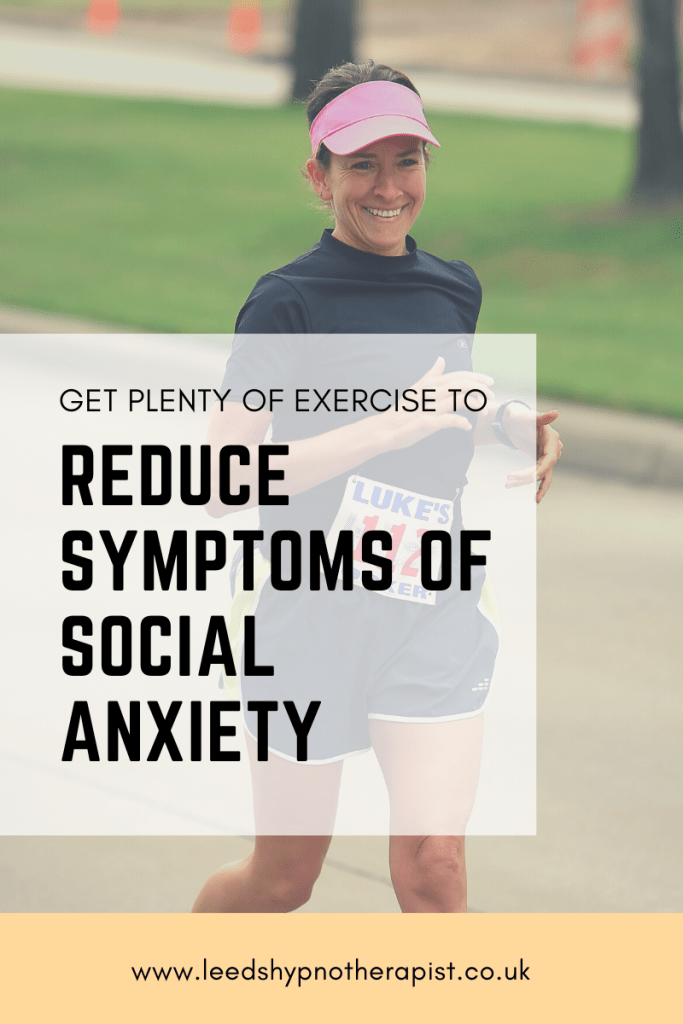
Take Time to Relax
Many people are worried about not being able to relax and feel “comfortable” in social situations, but their biggest problem is that they aren’t relaxing.
This is a big problem because various studies have shown that by relaxing and being comfortable, our minds become more open to new ideas and more creative. So if you want to be creative or have more ideas for your work, then you need to relax and be comfortable. Your brain will operate at its best when it is relaxed.
The first step in coping with social anxiety is to take a deep breath. Inhale into the belly of the body through the nose and exhale from the top of the head through the mouth. This will help your brain get a sense of perspective on what you are going through. You can do this before or after any social situation you’re going to encounter.
When you are feeling anxious, it can become really difficult to concentrate on anything else other than what you’re doing or thinking about; this will cause problems in your day-to-day functioning as well as in work at home or at school. You should also avoid reading negative comments about yourself online (Facebook is a good place for this) since these comments can provoke negative thoughts (which will only reinforce your anxiety).
Meditation is a very simple yet powerful way of relaxing your body and mind. By meditating for just 10 minutes every morning you will soon notice that your symptoms of social anxiety reduce or even disappear. Set yourself a 30-day meditation challenge to keep yourself on track with meditation.
Reframe Your Thoughts
So you’re going through the motions of everyday life, but your actions are all over the place. Your body is tense, your face is grim and you feel like you’re being watched. But why? You’ve never had a problem with anxiety before. You go about your business and do things as normal.
Then you start to think about things that are worrying you, like a specific situation or someone, and they just seem impossible to deal with. When you start to panic, it’s like someone has taken all the air right out of your lungs—you can hardly breathe and feel like your chest is going to explode. Your eyes are welling up with tears, because if you start panicking you will have no chance of getting control of yourself again.
The first thing we need to do is reframe our very thoughts on our experience:
“I feel anxious because I’m afraid that I won’t be able to cope.” “If I panic now then I will lose control.” “I’m not cut out for this job – it’s too stressful for me.” “No one will believe me if I say something stupid in front of my boss!” “I need help from my boyfriend or girlfriend – they know how much this job stresses me out!”
We can use hypnosis as a powerful tool for changing a person’s mindset and helping them reframe their experience in such a way that they are able to cope better with their anxiety. These are some of the key points we want to address when using hypnosis for social anxiety:
- Reframing Thoughts
- The Boring vs The Intense
- The Boring vs The Intense – How Social Anxiety Helps the Brain Become More Processing Ability (Boredom + Intense Fear = More Processing Ability)
Getting Plenty of Sleep
Sleep is important to your physical and mental health. Get plenty of sleep! If you have trouble sleeping, hypnotherapy for sleeping issues is highly recommended.
Increase Social Situations Gradually
People with social anxiety disorder often dread being in groups and tend to experience several symptoms including a sense of impending doom and an inability to concentrate.
The term “social anxiety” is often used to describe a type of fear or discomfort triggered by social situations. People who have this fear are often afraid that they will make a mistake or be embarrassed or humiliated by being in public with others. The fear can result in avoidance behaviours such as avoiding work or school, avoiding public places such as public transportation, not wanting to go shopping, avoiding hobbies and activities, etc.
The condition is characterized by the presence of intense fear-related avoidance behaviour and associated physiological arousal (high heart rate) during certain social situations (e.g., speaking in front of groups). Individuals with social anxiety disorder are usually aware that there is something wrong; however, they may not know what is causing the problem.
They may not know how to deal with it effectively for other people do not seem to understand their fears about getting out socially with people. They may feel anxious about going out because they are concerned about what others will think of them if they do so; however, the feelings usually pass after the first instance when there is no risk involved (e.g., when meeting new people for the first time).
Take your time interacting socially. ALWAYS do the inner work first before trying to put yourself into social situations. Otherwise, you are just going to reinforce the old social phobia feelings.
Coping Skills for Social Anxiety Disorder
The issue with most people with social anxiety is that they are not able to cope in social situations. We all have this issue, but for some, it is much more severe than others, and treatment can be a real problem. If you are suffering from social anxiety disorder, the first thing you need to do is see a hypnotherapist who specialises in this area.
Your hypnotherapist will help you understand why you have come to feel this way, and give you coping skills that will help ease your anxiety and make life manageable. You will also learn different ways of dealing with certain situations.
Hypnotherapy is the best form of treatment for social anxiety disorders. Not only does it fix the root cause of your anxiety, but it helps build confidence so that you can handle the everyday situations that come up in life.
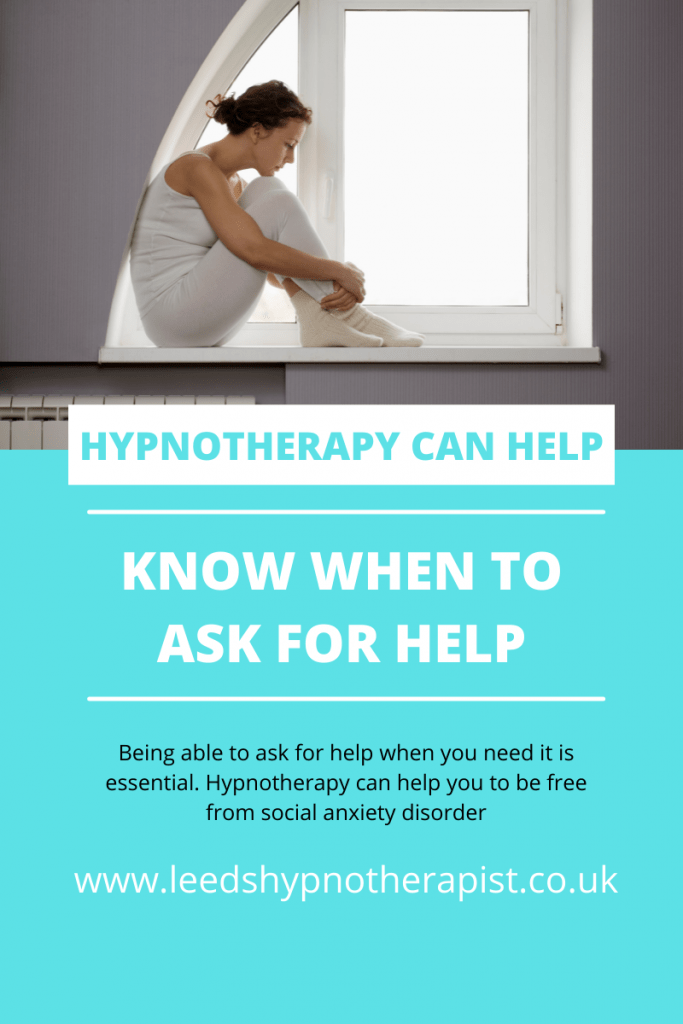
When to Get Help for Social Anxiety Disorder
When social anxiety disorder is taking over your life, it’s time to get the help that you need. It isn’t right that your life should be held back due to a social phobia. Social anxiety disorder symptoms can keep you in that persistent fear of just living life and doing things that others find so easy.
Your anxiety symptoms aren’t permanent and they can be addressed. Anxiety symptoms shouldn’t rule or ruin your life. Hypnotherapy can help you to get through these feelings and start to live freely again.
Treating Social Anxiety Disorder With Hypnosis
To be clear, my definition of social anxiety is not a disorder. It’s a different kind of emotion. Social anxiety is an involuntary reaction to social situations that causes you to experience intense discomfort and distress, usually accompanied by crippling self-doubt. It’s like the feeling you get when you have been caught doing something wrong — only this time, it feels like an out-of-body experience, as if your whole body is shaking.
I believe hypnotherapy can help you, and other people with social anxiety disorder, find a way to overcome their anxiety and live more fully in the world around them. If you think of it as a form of counselling and psychotherapy, I am an expert at helping clients achieve this goal through hypnosis.
Hypnotherapy offers many benefits for people suffering from social anxiety disorder including:
- Understanding more about the root causes of your fear
- Increasing your confidence in social situations
- Finding ways to cope with this fear without becoming paralyzed by it
- Getting back on track with happy life goals.
Treatments for Social Anxiety Disorder
We all have social anxiety in our lives. It is a very common condition that affects millions of people and it is often misunderstood. Many people think that social anxiety disorder can be cured but this is not true. If you are suffering from any form of social anxiety disorder, you need to seek professional help from a hypnotherapist who specialises in this area.
Hypnotherapy for Social Anxiety Disorder
Hypnotherapy is the most effective treatment for social anxiety disorder and is available to anyone who needs help.
Hypnotherapy is a form of therapy that uses hypnosis to change our thoughts and behaviour. Social anxiety has many causes including shyness, fear, rumination and fear of rejection. The Leeds Hypnotherapist can help you with any of these causes.
Finding Help for Social Anxiety Disorder Near Me
If you would like to get help with symptoms of social anxiety disorder using hypnotherapy, The Leeds Hypnotherapist is here to help you with this. Having helped people with anxiety disorder issues for over 10 years, you can relax knowing that you are getting help from someone that knows how to help you. No one should have to suffer from any type of social phobia.
To book a free consultation just go to the contact page and complete the short form.

